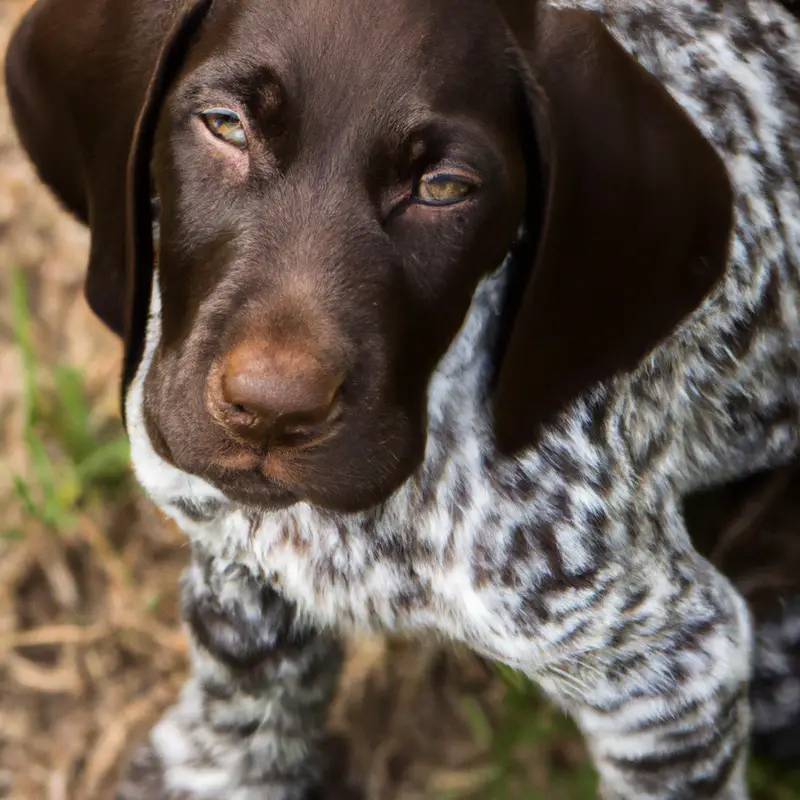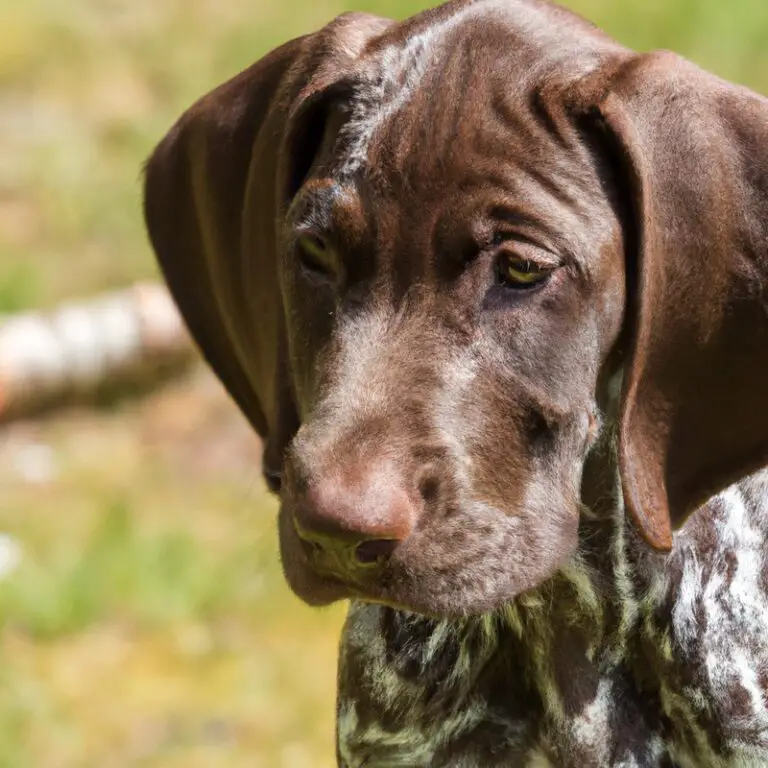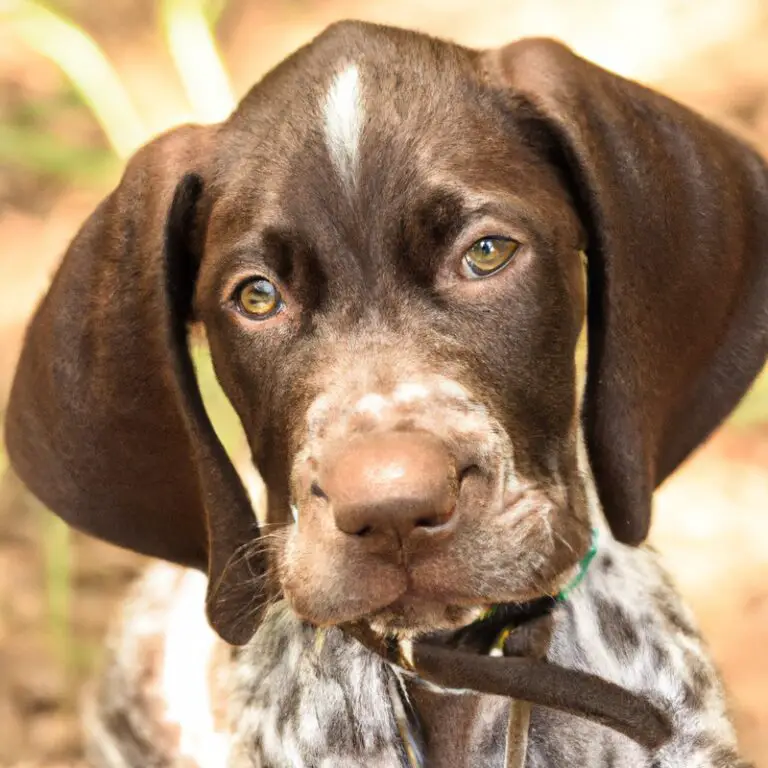Can a German Shorthaired Pointer Be Trained To Be a Search And Detection Dog?
Key Takeaways:
- German Shorthaired Pointers can be trained to be efficient search and detection dogs.
- Their natural hunting instincts make them suitable for tasks such as tracking and scent detection.
- Obedience training and positive reinforcement methods are effective in training German Shorthaired Pointers.
- Consistent training and regular mental and physical exercise are essential for their successful performance as search and detection dogs.
Imagine having a four-legged partner who possesses both the tenacity of a hunter and the intellect of a detective. Meet the German Shorthaired Pointer, a breed known for its versatility and trainability.
In this article, I will delve into the history and characteristics of this remarkable breed, and explore their potential as search and detection dogs.
From scent detection to search and rescue, drug detection to bomb detection, these intelligent and athletic canines have proven themselves in numerous roles. Join me as we uncover the challenges, training techniques, and success stories behind this incredible breed.
Get ready to be amazed by the capabilities of the German Shorthaired Pointer!
| Question | Answer |
|---|---|
| Can a German Shorthaired Pointer be trained as a search and detection dog? | Yes |
| Is the German Shorthaired Pointer breed known for its intelligence and trainability? | Yes |
| Are German Shorthaired Pointers used in search and detection work? | Yes |
| What qualities make the German Shorthaired Pointer suitable for search and detection work? | – High intelligence and trainability – Excellent sense of smell – Eager to work and please – Good physical endurance |
| What types of search and detection tasks can a German Shorthaired Pointer be trained for? | – Narcotics detection – Explosives detection – Search and rescue operations – Cadaver detection – Tracking missing persons – Wildlife detection – Firearms detection, etc. |
| What training is required to turn a German Shorthaired Pointer into a search and detection dog? | – Basic obedience training – Specialized detection training – Scent detection training – Simulated search scenarios – Handler training and collaboration |
| Can any German Shorthaired Pointer be trained for search and detection work? | No, not every individual German Shorthaired Pointer is suitable or has the right temperament for this specific type of work. |
The Versatile German Shorthaired Pointer
History and Origin
Here’s a concise and straightforward answer about the history and origin of the German Shorthaired Pointer. The German Shorthaired Pointer, often called the GSP for short, has a rich history and an interesting origin story.
This versatile breed was developed in Germany during the 19th century.
Hunters wanted a dog that could do it all – from pointing and retrieving to tracking and trailing. So, they mixed various breeds, including the Spanish Pointer, Bloodhound, Foxhound, and various types of German scent hounds, to create the German Shorthaired Pointer.
The result was a dog that excelled in the field and became popular among hunters for its versatility and intelligence.
It quickly gained recognition for its ability to hunt both on land and in water, making it a great choice for hunting various game, from birds to larger game like deer. Over time, the German Shorthaired Pointer made its way to other countries and gained popularity as a hunting companion and a beloved family pet.
Today, it is not only a fantastic hunting dog but also a loyal and affectionate family member for many households around the world.
So, there you have it – a brief summary of the history and origin of the German Shorthaired Pointer.
Breed Characteristics
German Shorthaired Pointers have several distinctive characteristics that make them well-suited for search and detection work. First and foremost, they are highly intelligent and quick learners.
This makes them capable of understanding and executing complex tasks.
Their strong sense of smell combined with their exceptional athleticism allows them to cover large areas efficiently. They are also known for their high energy levels, which enable them to maintain focus and endurance during long search operations.
Their natural hunting instincts make them excellent at tracking scents and locating hidden objects.

Degree of Trainability
When it comes to the German Shorthaired Pointer, you’ll be pleased to know that they are highly trainable dogs. This breed is known for being intelligent, cooperative, and eager to please their owners.
Whether you want to teach them basic obedience commands or more advanced skills, the German Shorthaired Pointer is up for the challenge.
First and foremost, consistency and positive reinforcement are key when training this breed. They respond well to praise, treats, and playtime as rewards for good behavior.
With their natural athleticism and desire to work, they excel in various dog sports such as agility, obedience trials, and even search and detection work.
German Shorthaired Pointers have a strong instinct for hunting and tracking, making them a great candidate for search and detection training. With proper guidance and structured training, they can learn to pick up scents, track trails, and locate hidden objects.
Their high level of trainability, combined with their enthusiasm and intelligence, make the German Shorthaired Pointer an excellent choice for search and detection work.
However, it’s important to note that training should be done gradually and at the dog’s pace, always focusing on positive reinforcement and building a strong bond between the dog and handler.
Search and Detection Dog Training
Search and detection dog training is a specialized form of training that prepares dogs to use their keen senses to find specific targets or substances. The key to successful search and detection dog training lies in a few important factors.
First and foremost, the training needs to begin at a young age to ensure that the dog develops the required skills and instincts.
Early training helps to mold their behavior and create a strong foundation. Consistency and repetition are crucial in search and detection dog training.
Dogs need to practice searching for the target or substance over and over again until it becomes second nature to them.
This helps to reinforce their skills and build their confidence. Positive reinforcement is another important aspect of search and detection dog training.
By rewarding the dog for successfully finding the target, they learn to associate their actions with positive outcomes.
This encourages them to continue searching diligently. Search and detection dog training also involves gradually increasing the difficulty level of the searches.
Dogs should be exposed to different environments, distractions, and scents to ensure they can adapt and perform well in various situations.
Lastly, the handler’s communication and bond with the dog is vital in search and detection dog training. Clear and effective communication ensures that the dog understands what is expected of them and builds trust between the two.

Scent Detection Training
Scent detection training is a fascinating and rewarding skill that many dogs, including German Shorthaired Pointers, can excel at. In this type of training, dogs learn to use their powerful noses to locate specific scents, such as narcotics, explosives, or even missing persons.
First and foremost, a dog must have the natural ability and drive to detect scents in order to be successful in scent detection training.
German Shorthaired Pointers, known for their keen sense of smell, are often well-suited for this type of training. To begin scent detection training, it’s essential to establish a strong foundation of obedience and focus.
This includes commands like sit, stay, and come, which will be important for the dog to follow instructions during search missions.
A key aspect of scent detection training is introducing the target scent to the dog. This can be done by pairing the scent with a reward, such as treats or play, to create a positive association.
Gradually, the scent is hidden in various locations, and the dog is encouraged to use their nose to locate it.
As the training progresses, the difficulty level can be increased by using more challenging hiding spots or introducing distractions. The ultimate goal is for the dog to confidently and accurately locate the target scent, signaling to their handler that they have found what they were searching for.
Consistency, patience, and positive reinforcement are crucial throughout the scent detection training process.
It’s important to remember that not all dogs will excel at scent detection, and some may require more time and effort to reach their full potential. However, with the right training approach and a willing dog, scent detection can be a rewarding and beneficial skill for both the dog and their handler.

Search and Rescue Training
Search and Rescue Training is an important aspect of training for many working dogs, including German Shorthaired Pointers. This specialized training prepares dogs to locate and retrieve missing persons, whether in wilderness areas, disaster sites, or urban environments.
It is no easy task, but with proper training, these dogs can become highly skilled search and rescue professionals.
First and foremost, search and rescue training focuses on developing a dog’s scent detection abilities. Dogs are taught to differentiate and follow specific scents, such as those of a missing person, in order to locate them.
They undergo rigorous training to learn how to search efficiently and effectively, using their noses to lead them to the person in need.
In addition to scent detection, search and rescue dogs are trained in tracking and trailing techniques. They learn how to follow a person’s scent over different terrains and in various weather conditions.
This skill is crucial when it comes to locating individuals who may have gone off the beaten path or are difficult to find.
Search and rescue dogs also undergo obedience training to ensure they can work reliably off-leash and follow commands from their handlers. They learn to navigate obstacles, such as rubble or dense vegetation, without getting distracted.
This training helps to keep both the dog and their handler safe during search operations.
Physical fitness is another important aspect of search and rescue training. Dogs must be in peak physical condition to handle the physically demanding tasks of search and rescue work.
Regular exercise, strength training, and endurance-building activities are incorporated into their training regimen.
Drug Detection Training
Drug detection training is a crucial aspect of training for search and detection dogs. A German Shorthaired Pointer can certainly be trained to excel in drug detection.
First and foremost, the training process involves teaching the dog to identify and alert on the specific odor of drugs.
This is done through a series of exercises that gradually introduce the dog to various drug scents. The training typically starts with simple odor recognition tasks, where the dog learns to associate the smell of drugs with a positive outcome, such as praise or a reward.
As the dog progresses, more complex exercises are introduced, like searching for drugs in different environments and various hiding spots.
Consistency and repetition are key in drug detection training. The dog needs to be exposed to different types of drugs and various scenarios to ensure a well-rounded and reliable detection ability.
Regular training sessions and ongoing reinforcement are necessary to maintain the dog’s skills.
In addition to scent detection, other skills like obedience and agility are also important for a successful drug detection dog. These skills can be incorporated into the training program to enhance the overall performance and reliability of the German Shorthaired Pointer.
By implementing a well-structured and comprehensive training program, a German Shorthaired Pointer can become a proficient drug detection dog, capable of assisting in detecting illegal substances with accuracy and efficiency.
Bomb Detection Training
Bomb detection training is an important aspect of training for search and detection dogs. These highly skilled dogs are trained to use their keen sense of smell to locate explosive materials.
First and foremost, they are taught to detect the scents of different explosives and alert their handler when they find something suspicious.
During bomb detection training, dogs are exposed to a variety of explosive materials under controlled conditions. They learn to identify the scent of these materials and differentiate them from common items.
This training is based on positive reinforcement, where dogs are rewarded when they correctly indicate the presence of explosives.
Handlers play a crucial role in bomb detection training. They undergo specialized training to develop the necessary skills to work effectively with these dogs.
Handlers learn how to read their dog’s behavior and understand their alerts, which can vary from a sit, down, or bark.
To ensure the reliability and accuracy of bomb detection dogs, ongoing training and maintenance are necessary. Continuing education, regular practice sessions, and exposure to new scents are essential in keeping these dogs sharp and effective in their work.
While German Shorthaired Pointers are known for their versatility, not all of them may be suitable for bomb detection training.
This specialized training requires a specific temperament, drive, and focus that may vary from dog to dog. However, with proper selection and training, German Shorthaired Pointers can excel in bomb detection work.
Training Tips and Techniques
When it comes to training a German Shorthaired Pointer to be a search and detection dog, there are a few key tips and techniques to keep in mind. First and foremost, consistency is key.
Make sure to establish a consistent training schedule and stick to it.
Repetition is important, as it helps reinforce the desired behaviors. Positive reinforcement is also crucial.
Use rewards such as treats, praise, and play to motivate and encourage your dog during training sessions.
This will make the learning process more enjoyable for them and help them retain the information better. Another important technique is to start with basic obedience training before moving on to specific search and detection tasks.
Teach your dog commands like sit, stay, and come, as these will provide a solid foundation for more advanced training later on.
Incorporating scent games into your training routine can be beneficial as well. This involves hiding objects or treats and encouraging your dog to use their sense of smell to find them.
Gradually increase the difficulty of the hiding spots to challenge their skills.
Remember to be patient and work at your dog’s pace. Training takes time and each dog is unique in their learning abilities.
With consistency, positive reinforcement, and the right techniques, your German Shorthaired Pointer can be trained to excel as a search and detection dog.
The Importance of Professional Training
Professional training is key to ensuring the success of any endeavor, and this holds true for training a German Shorthaired Pointer as a search and detection dog. First and foremost, professional trainers have the knowledge and expertise needed to effectively train dogs for specialized tasks.
They understand the specific techniques and methods required to develop the necessary skills in a German Shorthaired Pointer to excel in search and detection work.
Additionally, professional trainers provide a structured and systematic approach to training. They create a customized training plan that takes into consideration the individual needs and abilities of each dog.
This personalized approach ensures that the training is tailored to suit the specific requirements of search and detection work.
In addition, professional trainers have access to specialized equipment and facilities that are essential for training German Shorthaired Pointers as search and detection dogs. These resources facilitate the learning process and create a realistic training environment that simulates real-life situations.
Moreover, professional trainers have extensive experience working with different breeds and temperaments of dogs.
They know how to handle and communicate with the dogs in a way that fosters trust and cooperation, which is crucial for a search and detection dog.
Challenges and Considerations
Temperament Challenges
Temperament challenges can be a crucial aspect when it comes to training a German Shorthaired Pointer (GSP) as a search and detection dog. First and foremost, GSPs are known for their high energy levels and enthusiasm, which can sometimes make them easily distracted during training sessions.
Additionally, their independence and stubbornness may pose challenges in terms of obedience training and following commands consistently.
This breed’s strong prey drive and hunting instincts can also affect their focus and may require extra effort to redirect their attention towards the specific task at hand. Maintaining patience, consistency, and positive reinforcement techniques can help overcome these temperament challenges and mold a GSP into a successful search and detection dog.
Physical Challenges
When it comes to training a German Shorthaired Pointer (GSP) to become a search and detection dog, there are some physical challenges to consider. First and foremost, GSPs are energetic and active breeds that require plenty of exercise.
They have a lot of stamina and need regular, intense physical activity to keep them engaged and focused.
Another physical challenge with GSPs is their strong prey drive. These dogs have a natural instinct to hunt and chase, which can make it difficult to train them for detection work.
It’s crucial to channel their energy and prey drive in the right direction by providing structured training and positive reinforcement.
Additionally, GSPs have a strong sense of smell, but they may not have the same level of scenting ability as some other detection dog breeds. This means that extra attention and patience may be required during the training process to develop their scenting skills.
Breed-Specific Challenges
Breed-specific challenges can arise when training a German Shorthaired Pointer (GSP) to be a search and detection dog. GSPs are known for their high energy levels and need lots of exercise.
This can make it challenging to keep them focused during training sessions.
Additionally, GSPs have a strong prey drive and may be easily distracted by small animals or scents in the environment. It’s important to address these challenges by providing ample mental and physical stimulation, using positive reinforcement techniques, and gradually introducing distractions during training.
Patience and consistency are key when working with this breed.
Handler-Related Challenges
Handler-Related Challenges in training a German Shorthaired Pointer (GSP) as a search and detection dog can be quite demanding. Here are some challenges that handlers may encounter:
- Dedication and Consistency: Training a GSP requires a committed and consistent handler. Their dedication to practice and reinforce commands is crucial for the dog’s success in search and detection tasks.
- Patience and Perseverance: GSPs can be independent and strong-willed, which may pose challenges during training. Patience and perseverance are key in working through stubborn moments and maintaining a positive training environment.
- Time and Effort: Training a search and detection dog like a GSP necessitates significant time and effort from the handler. Consistent training sessions, daily exercise, and mental stimulation are essential for the dog’s development.
- Knowledge and Skills: Handlers need to have a solid understanding of positive reinforcement training techniques and be able to apply them effectively. They should possess the necessary knowledge and skills to teach the dog to search and respond to specific scents.
- Physical Fitness: GSPs are highly energetic dogs that require regular exercise to stay physically fit. Handlers need to be physically capable of providing the necessary exercise and conditioning required for the dog’s overall well-being.
Overcoming these handler-related challenges requires dedication, patience, and a deep understanding of the dog’s breed characteristics. With the right approach and training methods, a GSP can excel as a search and detection dog.
Consistency and Persistence
Consistency and persistence are key when training a German Shorthaired Pointer to be a search and detection dog. These traits are crucial for success in any training program.
First and foremost, consistent training methods must be used.
This means using the same commands, techniques, and rewards each time. By being consistent, the dog can better understand what is expected of them and will learn more quickly.
Persistence is also important.
Training a search and detection dog takes time and effort. It’s important to stay committed and not give up if progress is slow.
Consistent and persistent training will eventually pay off, allowing the German Shorthaired Pointer to reach their full potential as a search and detection dog.
Success Stories
Real-Life Examples of German Shorthaired Pointer Search and Detection Dogs
German Shorthaired Pointers have proven to be excellent search and detection dogs in real-life scenarios. These dogs have displayed their exceptional skills and abilities in various fields.
For instance, they have been successfully trained as drug detection dogs, tracking and trailing dogs, and even search and rescue dogs.
In drug detection, German Shorthaired Pointers have shown a remarkable aptitude for sniffing out illegal substances. Their keen sense of smell and high energy levels make them ideal candidates for this line of work.
Many law enforcement agencies have employed German Shorthaired Pointers to assist in locating drugs, leading to numerous successful seizures and arrests.
German Shorthaired Pointers have also excelled as tracking and trailing dogs. Their natural hunting instincts and strong scenting abilities allow them to follow scents over long distances.
They have been used to track missing persons, criminals, and even lost pets.
Their dedication and determination have helped locate individuals in various challenging environments. When it comes to search and rescue operations, German Shorthaired Pointers have proven to be invaluable.
Their agility, stamina, and intelligence enable them to locate and reach people in need of assistance, even in rugged terrains and adverse conditions.
These dogs have been instrumental in locating individuals during urban disasters, wilderness searches, and natural disasters.
Notable Achievements and Recognitions
Notable Achievements and Recognitions German Shorthaired Pointers have proven themselves to be highly capable search and detection dogs, earning several notable achievements and recognitions. These intelligent and energetic dogs have made significant contributions to various fields.
One notable achievement is their success in search and rescue operations.
German Shorthaired Pointers have been praised for their exceptional tracking abilities and perseverance in locating missing persons. Their keen sense of smell and determination have led to the successful rescue of many individuals.
In addition, these dogs have excelled in the field of drug and explosive detection.
Their ability to detect even trace amounts of substances has made them invaluable assets in law enforcement agencies and security teams. Their efforts have played a vital role in keeping our communities safe.
German Shorthaired Pointers have also showcased their talents in competitive dog sports.
They have been recognized for their agility, obedience, and overall performance in activities like obedience trials and field trials. Their impressive athleticism and trainability have impressed judges and spectators alike.
These achievements and recognitions highlight the remarkable potential of German Shorthaired Pointers as search and detection dogs.
Their unique combination of intelligence, athleticism, and strong work ethic make them stand out in these fields. With proper training and guidance, these dogs can continue to achieve great things and make a difference in various industries.
Final Verdict
The German Shorthaired Pointer has proven time and again that it can be trained to be a highly effective search and detection dog. With its innate abilities and trainability, this versatile breed excels in various fields, including scent detection, search and rescue, drug detection, and bomb detection.
The success stories and notable achievements of German Shorthaired Pointer search and detection dogs serve as a testament to their capabilities.
However, it is important to note that training these dogs requires consistency, persistence, and the expertise of a professional trainer. By harnessing their natural talents and providing them with the necessary training, the German Shorthaired Pointer can truly shine as a remarkable search and detection dog.
Trust in the reliability and credibility of this breed when considering them for search and detection work.







